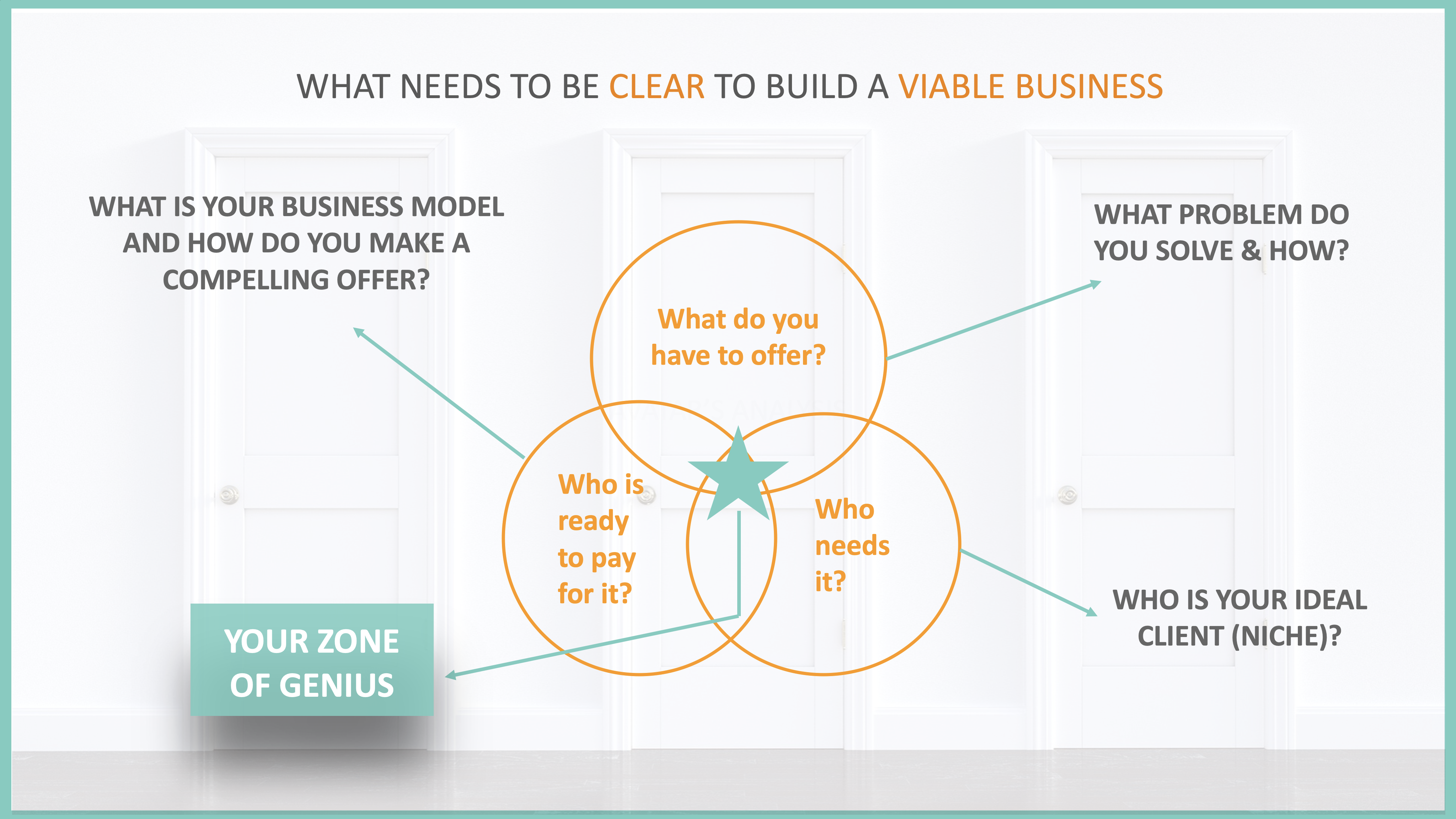What is stopping you from making your business idea a reality?
I have found that so often what holds potential entrepreneurs back from starting their portable business, or succeeding with it, is a lack of clarity about their business idea. Whether you have one big idea or lots of different ideas, if you are not clear about what you are trying to achieve, and the challenge that is stopping you, then you are not setting yourself up to succeed!
Today I want to share with you how to find clarity on your idea, and why taking the time to do this is critical to your business’ viability and profitability in the long term.
This blog article is a summary of the related podcast episode.
Click here to listen to the tips mentioned in this article.
If you are trying to start a portable business, you probably have lots of questions. You maybe have an idea of what you want to do but you are not sure how to make it happen. You could have lots of ideas and be wondering how to do it all or where to start and focus.
Before you do that, I want you to stop and ask yourself some big questions so that you have complete clarity about your business idea. Doing this work could save you time and money in the long-term and help you make sure that your idea will work.
What do you really want to achieve?
I really want you to sit down and think about this question. I want you to be able to say what the vision is not only for your business but also for your lifestyle and family situation. You need to be sure that it all fits together for you. If you are struggling with this question, here is another that might help.
If you had a magic wand and could achieve anything you want what is it that you would want to achieve?
The answers to these questions are so important because they are going to define the direction that you go in. I see so many people trying so many different business ideas just for the sake of starting somewhere. While I am a big fan of people who like to be adventurous and explore new ideas, there is a time for that and there is a time to pick a direction. At some point, you’re going to want stability and results in your bank account, and that’s when it is important to think strategically.
Here are some additional episodes that will help you think about these questions.
Three steps to career and life reinvention with Sundae Schneider-Bean: this has great tips on figuring out what you really want to do
Is your business aligned with what you really want to achieve?: this has guidance and advice on how to figure out whether your business goals are really in line with your lifestyle and what you want for yourself.
Three reasons that will stop you from bringing your business idea to life: this looks at why some people end up never bringing their ideas to reality, and what you can do to overcome these challenges.
You can also find additional exercises and resources to help you work through these questions in my free workbook, ‘Three steps to build the foundations of a successful portable business.’
Once you have answered these big questions on your vision and purpose, it is time to start being strategic about your business idea.
Finding your zone of genius
The foundations of a successful, viable, and profitable portable business are built on three questions.

The first one is, what do you have to offer? What is it that you are selling?
The second question is who is it for? What is your target audience?
And the third one is who is ready to pay for it, or in other words, what is your business model around that? And have you validated that people are ready to pay for it?
The area where these three questions meet is your zone of genius, which is where you can make a real impact with your business.
Having clear answers to these questions is critical to your business being viable and profitable
To help you answer those questions, I am going to give you some guidance to get started so that you can have some clarity on where your zone of genius is. You can also work through additional exercises in my free workbook. When you have clear answers to these questions, you’ll be able to identify your zone of genius, the place where you and your business can make a real impact, and see that your business can succeed.
1. What problem do you solve?
I love this quote from Albert Einstein. It sums up how I want you to think about the problems your business idea solves.
If I had an hour to solve a problem, I’d spend 55 minutes thinking about the problem, and five minutes thinking about the solution.
His approach is true for business too – your marketing strategy will only be effective if you can clearly define the problem that you are solving for people. Many people spent all their time talking about how wonderful their solution is when they are trying to sell their product, but the most important argument is what problem it solves for the customer. People don’t care as much about your solution as they do about you understanding and solving their problem. You need to be able to describe your customer’s pain points and be able to show that you can solve their problem.
If you are struggling with understanding the difference between what a problem is and what pain points are, here is an analogy that might help. Let’s say you are sick and go to the doctor. When you visit the doctor, you don’t tell them what illness you have, but you do complain about your symptoms, so you might say you have a fever, or perhaps a cough. This is what you want the doctor to fix, regardless of the diagnosis.
It is the same with your business idea. You need to know the symptoms of the problem that you want your business idea to solve. For example, in Tandem Nomads, my niche and focus have been on expat partners who struggle to keep their careers alive on the move. So that’s the problem. The challenges of keeping a career going when you move can lead to loss of confidence, a loss of financial independence, and a sense of purpose. These are the symptoms.
Please take some time and reflect on these ideas. Ask yourself, what problem do you want to solve with your business ideas. Then look at the idea which really resonates with you the most and where you can expand on the pain points or the symptoms of that problem. The more you know and understand the pain points and the problem, the more likely you are to be relevant to your potential clients.
Even if you have an existing business, these are important questions to focus on. If you are struggling to generate sales or revenue, being able to express and define the problem that you solve will help you gain clarity about your business idea and help you address the challenges you are facing.
A problem well defined is a problem half-solved.
No matter what stage your business is at right now, it is worth taking the time to really define the problem you want to solve. Gaining clarity on this will help you move forward and gain clarity on every other aspect of your business, and help you turn your business idea into reality.
2. Who is your ideal customer?
This is the second component that you must be truly clear about. You need to know what the niche you are focused on is – one of the worst business mistakes is to try to target everybody in the market. Trying to do that with little revenue or resources can be dangerous for your business – it will slow your growth and potentially cost you a lot of money, time, and energy. You may end up quitting or having to stop. Please make sure to think about who your ideal niche is – you are looking for a small portion of the market that is relevant and that you will be able to talk to more quickly.
If you try to resonate with everybody, you will resonate with nobody.
Make sure to figure out what that small portion of the market that you can relate to the fastest and the easiest is.
For more help on figuring out your niche, check out this episode:
How to find your niche and become the go-to-expert with Marielle Evertz
3. Who is ready to pay for your solution?
Once you have defined the problem you want to solve, and then you have found your niche, you need to make sure to validate the problem you want to solve. In other words, you need to be sure that people are genuinely struggling with the problem and are willing to pay to solve it. And here comes the big battle that I always try to win with all my clients and anybody who listens to this show!
One of the things that I have learned is how many steps people tend to skip when they launch their businesses or when they reflect on their business idea. So many people focus on what they are going to sell, what they will charge for it, and even on the business name and their website and logo design. I must tell you that these are all very unimportant things.
Your logo and website should be the least of your concerns at this stage.
Once you have clarity on what problem you want to solve and who you want to target, you need to do extensive market research to validate your idea and find out whether people will actually pay for it. You will have to run surveys, talk to people and finally, you will have to pilot or test your product or service to validate that people are willing to pay for it.
Make sure to take the time to do this research. If you try to skip it, you will meet so many different challenges and so much frustration. The more you try to validate your business idea, the more clarity you will have on where you can make an impact and get results.
The cost of skipping these steps
Why are people usually skipping these steps? More than anything else, it is a big mindset issue. So, if you’re in a place where you have a business idea that’s exciting you, but you’re not really sure how to bring it to reality, please don’t try to skip these steps! Although it might feel that you are being too slow and too theoretical, you need to remember that skipping these steps is not going to help you. You may feel like you are not making progress but in the long term, you will not move forward as successfully without paying attention to these critical foundations.
A lot of people think that a business is real when it has a logo or a website, or that you must have something tangible to show first. Some of my clients have been working hard establishing clarity and doing their research but have felt under pressure from family and friends who expect them to have something to show for their work.
Do not fall into that trap of feeling that you should be moving faster and have more to show.
You will end up spending time, energy, and money on things that may not be worth it to your business in the long run, and that will ultimately just slow you down.
The time you spend on gaining clarity and doing research is also more than building a strong foundation for your business. As you do your research and talk to people, you are already building a network for your business and talking to potential clients. Now, this is not the time to sell. I urge you to be curious and focus on listening to build solid relationships early in your business journey so that when you are ready to launch, you will have people there to support you and help spread the word. Most importantly though, ask questions that will help you validate your business idea, the pain points, and whether your solution is something that they will pay for. Learning those things is a tangible achievement!
So, do not look at what other people are doing or saying or telling you to focus on. Sit down and do the groundwork that so many people skip. That is what makes the difference between a successful business and a business that will fail. Having clarity on your business idea based on these points is what will make the difference for you.
Also, don’t forget to download your free guidebook to implement these steps, get clarity and bring your business idea to reality:

